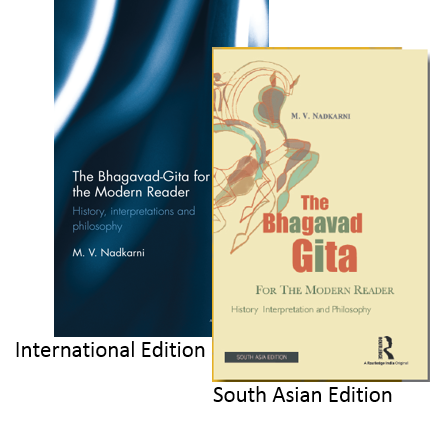The Bhagavad-Gita for the Modern Reader
What is the Bhagavad-Gita? Is it just a religious text? When was it composed? How relevant is it to the modern world?
This book answers these foundational questions and goes beyond. It critically examines the Bhagavad-Gita in terms of its liberal, humanist and inclusive appeal, bringing out its significance for the present times and novel applications. The author elaborates the philosophy underlying the text as also its ethical, spiritual and moral implications. He also responds to criticisms that have been levelled against the text by Ambedkar, D. D. Kosambi, and more recently, Amartya Sen.
Book Contents
1. Significance of the Gita, its date and authorship
As a sacred text; As a part of the Mahabharata
2. Classical commentators of the Gita
The Gita in the rest of the Mahabharata, and the Puranas; Shankara; Bhaskara; Ramanuja; Madhva; Others in the Sanskritic tradition;
Jnaneshwari – The Gita goes to people at large; Appendix to Chapter 2 on the three Acharyas and their philosophies
3. The Gita goes global
Wilkins’s English translation, impact and reactions; Reception in Germany; Further spread
4. Makers of modern India and their interpretations of the Gita
Raja Rammohan Roy; Bankimchandra; Theosophical Society and Annie Besant; Bal Gangadhar Tilak; Swami Vivekananda; Lala Lajpat Rai;
Mahatma Gandhi; Aurobindo Ghose; Swami Sahajananda Saraswati; Jawaharlal Nehru
5. Contemporary interpretations
Swami Ramdas; D. V. Gundappa (DVG); Swami Sivananda; K. M. Munshi; S. Radhakrishnan; Sri Sri Paramahansa Yogananda; Vinoba Bhave;
A. C. Bhaktivedanta Swami Prabhupada; Swami Ranganathananda; Eknath Easwaran; Swami Chinmayananda; Maharishi Mahesh Yogi;
Swami Dayananda Saraswati
6. Philosophy of the Gita
The Gita and the pursuit of happiness; Ethics in the Gita; God and His world; Sadhana: spiritual striving
7. Criticisms of the Gita and responses
Contradictions; Historicity; Is the Gita other-worldly? amoral? deterministic?; Is the Gita reactionary?; The Gita and its deontology; Miscellaneous criticisms
8. Novel applications
The Gita as a guide to leadership, enterprise and management; Pursuit of truth in scientific research; Success in career and life
Glossary
Bibliography
Name index
Subject index
